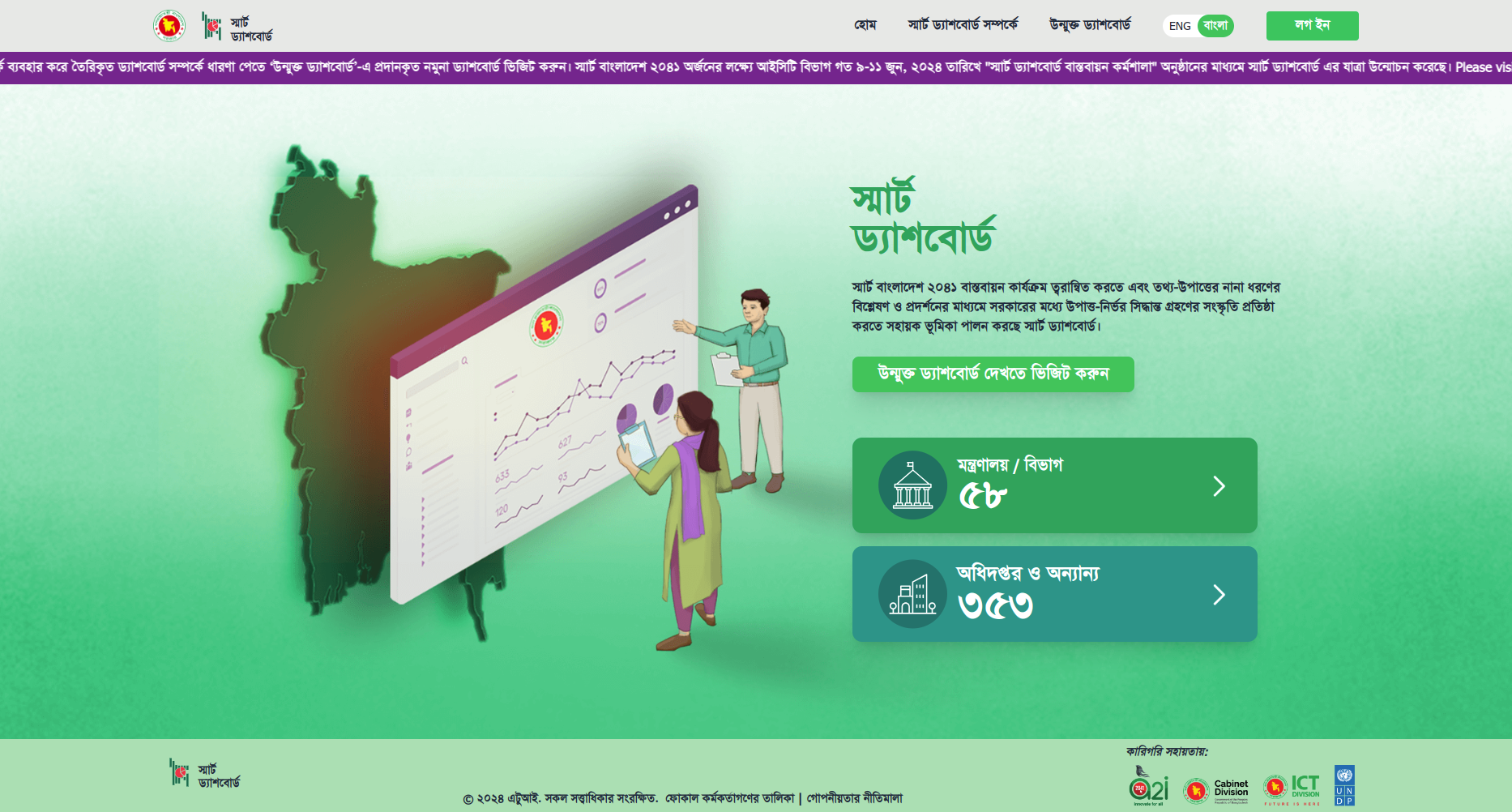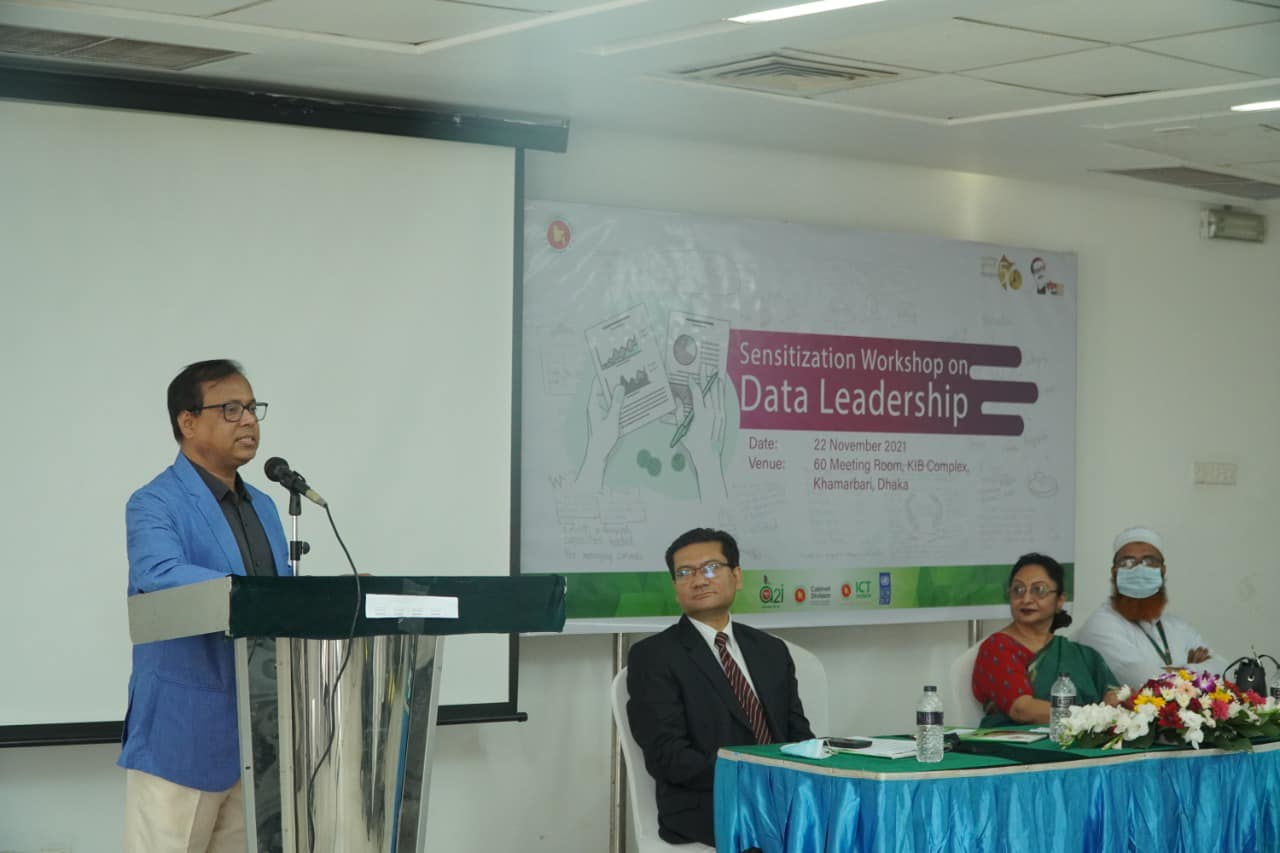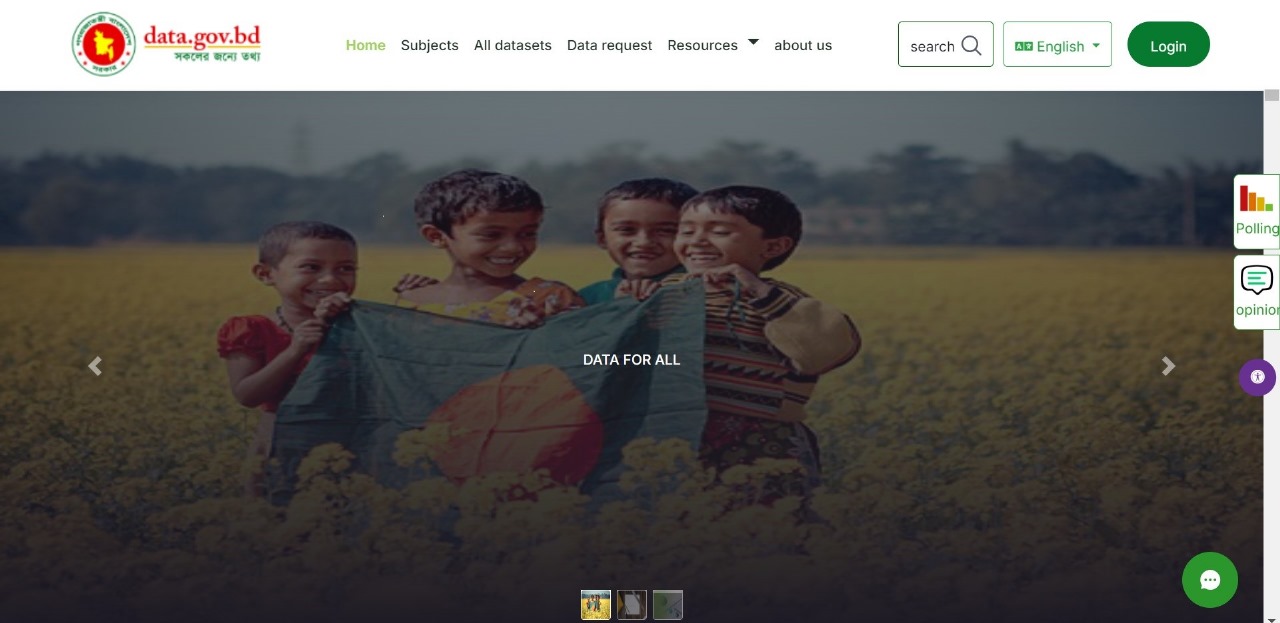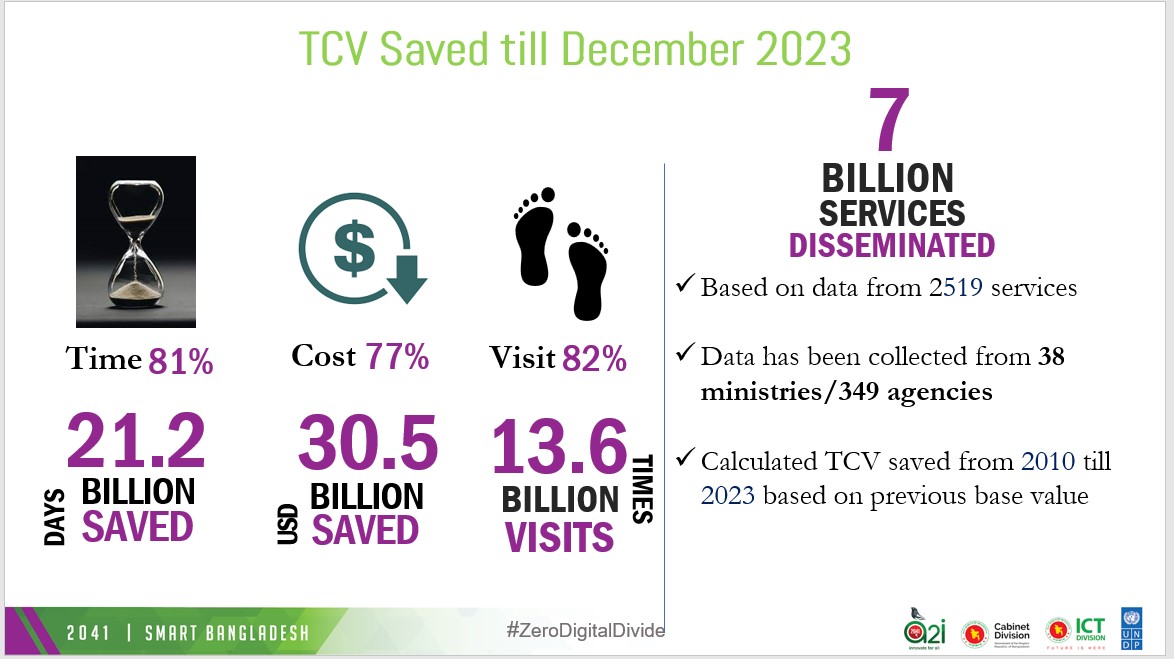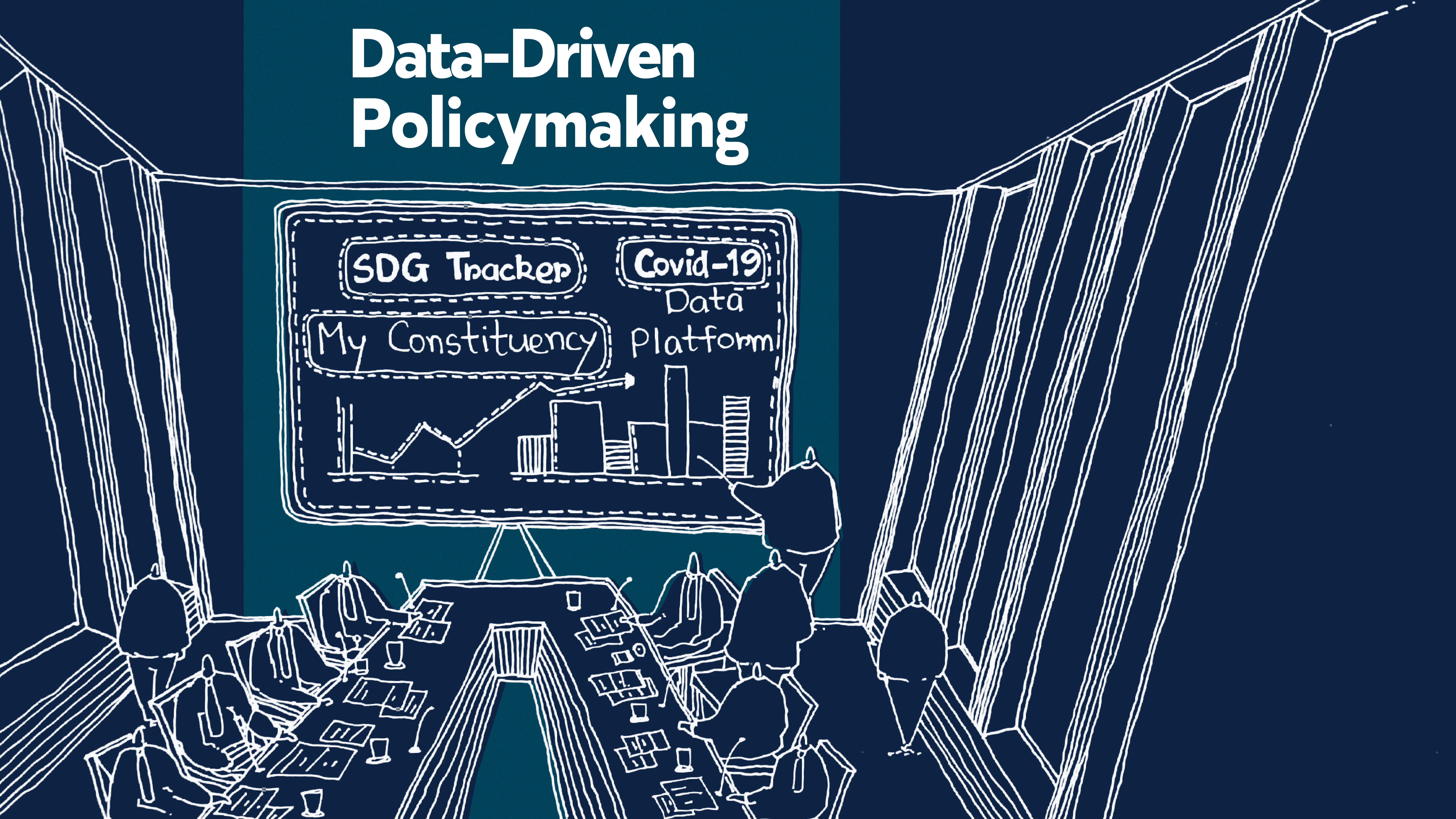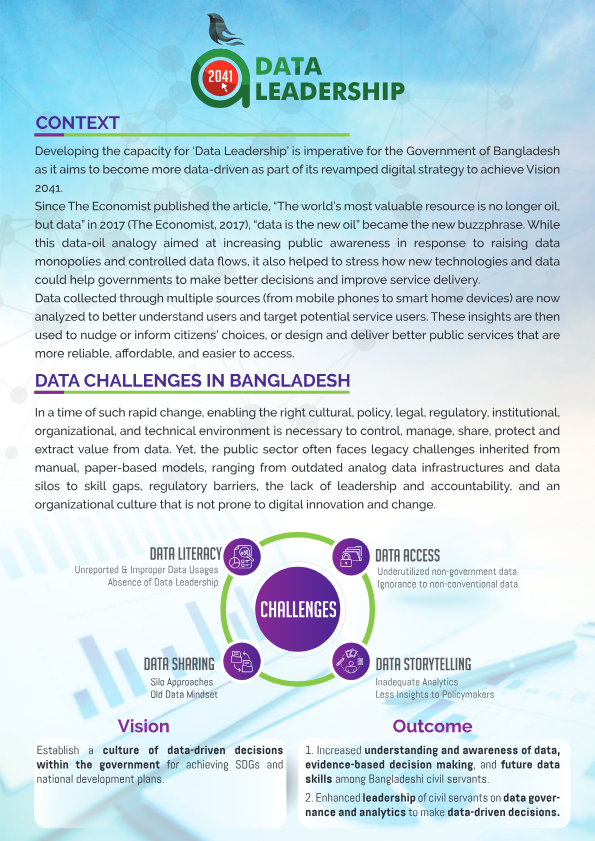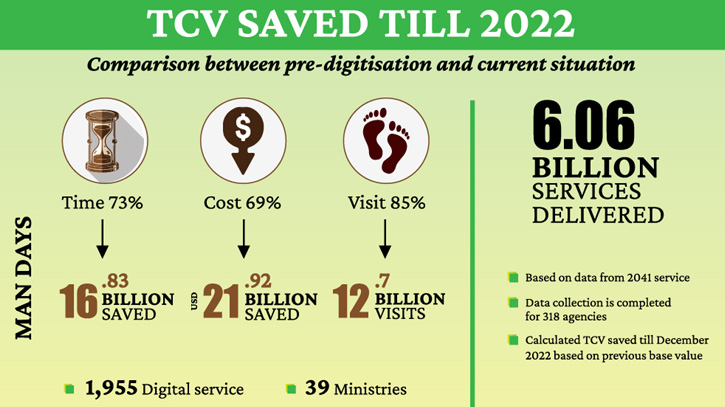Our Initiatives
Bangladesh has embraced data innovation to significantly enhance data-driven decision-making for achieving various national development plans. The government’s “Smart Bangladesh Vision 2041” prioritizes a data-centric approach focused on human-centric experiences. Within this vision, “Smart Government” is a critical pillar, aiming for transparent, accountable, and data-driven governance that is citizen-centric, interconnected, interoperable, integrated, and automated.
To achieve this vision, the government mandates all ministries and divisions to develop their own Smart Dashboards by 2025. These dashboards will be interoperable, leveraging advanced technologies by 2031. The ultimate goal is for all government decision-making to be data-driven and AI-based by 2041. To operationalize this striving vision, the Government of Bangladesh has undertaken the development of a comprehensive platform: Smart Dashboard.
The Smart Dashboard – a central platform – connects all government ministries and divisions and enables the officials of each ministry and division to develop their own Smart Dashboard, establishing a data-driven decision-making culture through dynamic analysis and visualization.
It facilitates the visualization of data across the government, allowing increased usage of conventional and non-conventional data sources, improved collaboration of data, and informed decision-making to unlock the power of data. This platform offers government officials a user-friendly interface to create customized dashboards for the quick and easy transformation of any datasets into clear visual representations, accessible to officials with varying technical expertise. As a result, all levels of government officials can leverage data-driven insights to foster transparency and accountability toward an interconnected, interoperable, integrated, automated, and citizen-centric government.
The Smart Dashboard initiative extends its benefits in enabling government officials to cultivate stronger leadership on data, data governance, data analytics, and emerging technology-based data innovation, thereby increasing competence and accelerating progress toward achieving the Smart Bangladesh Vision 2041. This initiative further contributes to ensuring zero digital divide by harnessing data for decision-making, ultimately leading to a data-centric knowledge-based government for inclusive development.
Thus, Smart Dashboard – an all-encompassing approach, establishing a data-driven decision-making culture, data leadership, and data-driven governance, is instrumental in ensuring the successful implementation of the Smart Bangladesh Vision 2041.
Technical Foundation of Smart Dashboard: The National Dashboard Framework (NDF)
The Smart Dashboard is built upon the National Dashboard Framework (NDF), a unique tool that ensures consistency and interoperability across all government smart dashboards.
Highlights/Features
- Data Visualization
- Customizable Dashboards
- User-friendly Interface
- Interoperability
- Decision Support
Link: dashboard.gov.bd
a2i launched a Data Leadership Initiative in 2021 to establish a data-driven decision-making culture within the government for establishing Smart Bangladesh 2041. More specifically, the project aims to:
- Sensitize the civil servants on data, and data analytics to make public institutions more effective
- Build the capacity of the govt. officials to design data projects through data innovation
- Capacitate public institutions to engage in data-driven effective policy/decision-making
Launching Event of Data Leadership- Promotion in a2i Facebook Page:
https://www.facebook.com/362213890520498/posts/6513110702097422/?d=n
Strategies
- Connecting whole-of-Government
- Approaching whole-of-Society (academics, industry, and private sector)
- Skills for data-driven decision-making by developing smart dashboards
- Facilitating co-creation of readiness of the civil servants on data-driven decision-making
- Collaboration with international partners/donors for data partnership, knowledge management, experience sharing, and better implementation
Activities/ Process of Implementation
Data Problem Identification
Matchmaking
Problem-solving through Data
Highlights
- Develop smart dashboards as decision support tools for the government ministries, divisions, etc. using frontier technologies such as Artificial Intelligence.
- Strengthen future data skills for Smart Bangladesh 2041
Achievement
Bangladesh’s Data Leadership initiative – enabled sensitizing 20 ministries and 85 agencies on data-driven decision-making and empowered over 800 civil servants on data-based problem identification, data-based problem solutions, data analytics, and data visualization. As a result, 17 government agencies have developed dashboards as well.
Bangladesh’s SDG Tracker is the world’s one of the first central-level SDG progress tracking tools that harmonizes data revolution in Bangladesh at the heart of evidence for ensuring sustainable development. It is a critical role player in integrating the development plans and policies to ensure that no one is left behind on the country’s development journey.
During the Millennium Development Goal (MDG) era, Bangladesh experienced challenges regarding data coordination, progress tracking, monitoring, and national & international reporting which emphasized the government of Bangladesh developing an integrated data repository – SDG Tracker for SDG results management and other national development plan implementation. It is a joint initiative of the a2i Programme and the Bangladesh Bureau of Statistics (BBS) and was launched by the Honorable Prime Minister of Bangladesh Shiekh Hasina at the 72nd Session of the UN General Assembly in 2017.
This initiative envisions to:
- Create a data repository for monitoring the implementation of the SDGs and other national development goals
- Facilitate the tracking of progress against each goal, target, and indicators
- Compare the national progress with the regional-level progress and guide to identify the pocket areas
- Improve situation analysis and performance monitoring
- Enable predictive analysis for achieving the targets within the stipulated time frame
- Facilitate evidence-based decision-making among the government to accelerate the implementation of SDGs and other national development plans and agenda
How it works:
There are currently 231 indicators in SDG. How information or data management will be ensured in these 231 indicators in the SDG Tracker is determined through the ‘Monitoring and Evaluation Framework’. This ‘Monitoring and Evaluation Framework’ has been prepared by the General Economic Division (GED) of the Ministry of Planning through several workshops and discussions with the representatives of the Prime Minister’s Office, Bangladesh Bureau of Statistics (BBS) which is the National Statistics Office (NSO) of Bangladesh and all other ministries departments/ offices/organizations related to SDG. The framework sets targets for the provision of indicator-based data, baseline data, to 2025 and 2030.
In the SDG Tracker, an officer of the concerned Ministry/ Division/ Department/Organization is assigned as the data provider who provides the data, and a senior official is assigned as the data approver who verifies and approves the data. After that, the data of that indicator is verified by a designated authority and published in the SDG Tracker with the required approval. The entire process is carried out in the SDG Tracker system. Besides, to ensure regular, updated, and reliable information in the SDG Tracker, the latest status of data of each Ministry/ Division/ Department/ Organization is regularly raised and discussed in the meetings of the National Data Coordination Committee (NDCC) chaired by the Secretary of Statistical and Informatics Division (SID) under Ministry of Planning.

Benefits:
- It enables policymakers to formulate evidence-based policy.
- Citizens can easily track progress and access relevant data which will create awareness.
- Quality data and analysis enable different sectors to analyze and make rational decisions for the betterment of the citizens.
- It helps the government institutes to make informed allocation of resources. This improves the situation analysis and performance monitoring.
- This enables all government agencies to prioritize early action.
- The key implementation challenges are understood through this Tracker.
- Gaps are identified and actions are taken instantly to achieve the SDGs.
- It creates an environment of healthy competition among various organizations in terms of achieving the SDGs.
Achievement
- SDG Tracker has been used by the ministries, and policymakers for SDG implementation Review, SDG progress Report, National Benchmark Values, etc.
- 194 SDG indicators data available
- 94 government agencies of 43 ministries are connected
- More than 1,400 government officials received training in SDG Results Management
For more info: www.sdg.gov.bd
Bangladesh has made efforts to promote open government data (OGD) to enhance transparency, accountability, and public participation. The government of Bangladesh has launched the Bangladesh Open Government Data Portal (data.gov.bd) to provide access to various datasets from different government departments and agencies. The portal includes datasets related to agriculture, education, health, finance, transportation, and other sectors. These datasets can be valuable for researchers, policymakers, businesses, and the general public.
Open Government Data Portal Link: http://data.gov.bd/
Bangladesh Open Government Data Strategy: https://sid.portal.gov.bd/sites/default/files/files/sid.portal.gov.bd/notices/e1531b3c_460d_49a6_82bf_36b9b61b8b1d/Open%20Government%20Data(OGD)%20Strategy%202016.pdf
The Government of Bangladesh (GoB) has emphasized innovations and digitization in public service delivery to ensure citizens’ easy access to services at their doorsteps. Service delivery has been made easier and faster through Service Process Simplification (SPS), converting manual services to electronic or mobile-based services (E/M services), etc. In the initial stage of e-Governance in Bangladesh, measuring the effectiveness of those digitized and simplified services was difficult. Also, there was no tool or idea to identify the appropriate indicators to be recorded and tracked to measure and improve public service delivery. In that situation, the Aspire to Innovate (a2i) Programme of the ICT Division, Bangladesh, came up with “Time, Cost and Visit (TCV) Measurement,” a unique evaluation tool to assess the service delivery process by measuring impacts from the citizen’s point of view.

Benefits
TCV research is conducted:
- to understand the changes brought by shifting from manual to electronic/simplified services;
- to allow the GoB to promote its activities, bring innovations in better service delivery;
- to help the government offices decide whether to scale up their innovations; and
- to guide for encouraging more simplified and online/automation services;
- to ensure transparency and accountability in service delivery and build strong institutions.
TCV research has shown enormous potential for providing citizen- friendly services by assessing public services and has become an established tool for measuring government services from the national perspective. Reducing TCV has now become the buzzword for public service delivery in Bangladesh.
TCV Innovation Brief:
https://a2i.gov.bd/wp-content/uploads/2023/10/TCV-innovation-brief-1.pdf
TCV news links:
https://a2i.gov.bd/going-digital-has-been-a-godsend/
https://a2i.gov.bd/digitisation-saves-21-92b-for-public-service-recipients/
https://a2i.gov.bd/how-digitisation-efforts-on-time-cost-and-visit-tcv-is-make-peoples-life-easier/
Sanitation Data Governance: Unleashing Opportunities and Tackling Challenges for Improved Sanitation
Bangladesh has made remarkable progress in the sanitation sector, achieving 98.5% basic sanitation coverage for its population. However, the country still faces significant challenges in ensuring safely managed sanitation and hygiene for all, which is the target of SDG 6.2 under the 2030 Agenda for Sustainable Development. According to the JMP data, only 39% of the population has access to safely managed sanitation services, which means that they use improved facilities that are not shared with other households and that safely dispose or treat excreta.
Sanitation is more than just providing latrines. It requires an integrated system that involves various aspects such as toilets, fecal sludge, solid waste, drainage, hygiene, gender equality, etc. To plan, implement and monitor such a system effectively, reliable, and comprehensive data is essential. However, sanitation data is often incomplete, inaccurate, under-represented or siloed in different sources and formats, which hinders evidence-based decision making and resource allocation. Moreover, sanitation data governance requires collaboration, coordination and standardization among various stakeholders and institutions working in the sector.
To address these challenges and to accelerate the progress towards achieving SDG 6.2, the Department of Public Health Engineering (DPHE), and a2i, the multisectoral digital transformation center of the Government of Bangladesh have started a new initiative to establish a Sanitation Data Command Center in Bangladesh. The Bill & Melinda Gates Foundation is providing the financial support, and Global Water and Sanitation Center (GWSC) is responsible for overall management and coordination of the initiative, under the “Strengthening of Public Data Systems for Sanitation in Bangladesh (SPDSSB)” program. This is a unique and timely initiative to enable evidence-based decision-making culture for supporting SDGs in smart WASH and sanitation in Bangladesh.
A workshop on sanitation data command center was held on July 6, 2023, aimed to identify objectives and goals of the command center as well as to solicit feedback and suggestions from various experts and representatives. It was organized by a2i, and ITN-BUET, Dhaka. The Principal Coordinator of SDG Affairs at PMO was the Chief Guest. The Secretary of Local Government Division, the Director of ITN-BUET, and Co-Director of GWSC were the special guests. The Project Director of a2i was the Chair of the workshop and the Chief Engineer of DPHE shared the welcome note.
DPHE and a2i shared two presentations to set the context of the workshop, and GWSC set the context for overall program on the “Strengthening of Public Data Systems for Sanitation in Bangladesh (SPDSSB)”.
The Sanitation Data Command Center will provide a one-stop platform for accessing, storing, analyzing and visualizing sanitation data from various sources and levels. It will build on the existing National Sanitation Dashboard, which was established by DPHE in 2019 with the assistance of the BMGF. The dashboard contains sanitation, solid waste, drainage, SFD related information of 61 cities across the country. The Sanitation Data Command Center will expand the scope and coverage of the dashboard to include additional information on rest of the cities and eventually data from rural areas.
The Sanitation Data Command Center will support data-based decision making, resource planning and management, policy formulation and implementation, and progress tracking and reporting for the sanitation sector. It will also foster transparency, accountability and participation of different actors and beneficiaries in the sector. Moreover, it will contribute to achieving other SDGs that are interlinked with water and sanitation, such as health, education, gender equality, poverty reduction, etc.
The Sanitation Data Command Center is a first-of-its-kind initiative in South Asia, is expected to be operational by 2023, and a noteworthy example of Bangladesh’s vision of Smart Bangladesh. It is a significant step towards ensuring adequate and equitable sanitation and hygiene for all by 2030.
Published at Global Water and Sanitation Center
Sanitation Data Command Centre: A Leap Towards Sustainable Development in Bangladesh
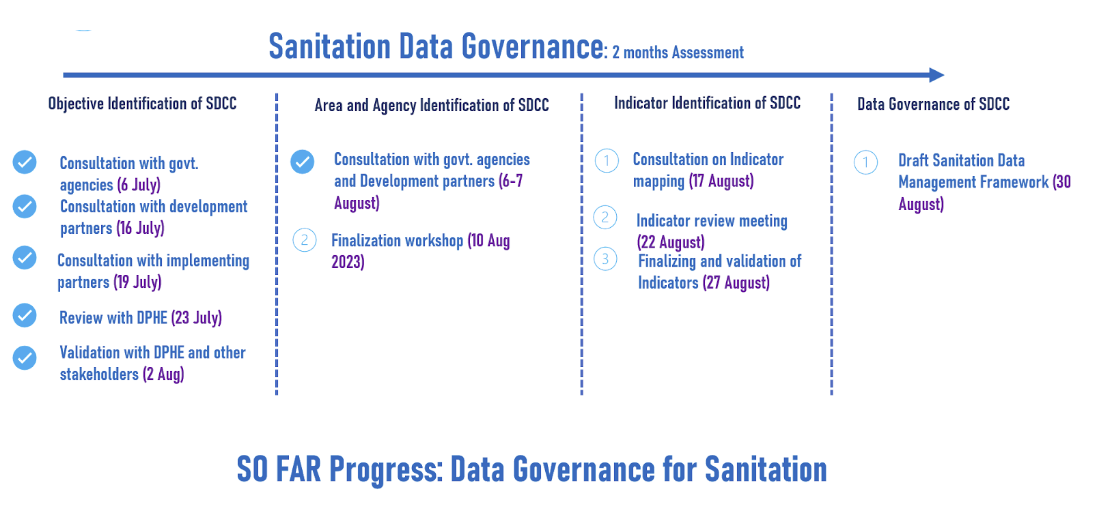
a2i has supported the Bangladesh Bureau of Statistics (BBS) which is the National Statistical Office (NSO) of Bangladesh to develop a Poverty Estimation Model using non-traditional data sources in collaboration with the SDG Coordinator’s Office, UN Statistics Division, UN Data Group, UN Resident Coordinator’s Office and University of Southampton under Data For Now Initiative. It is considered a revolutionary exercise whose purpose was to strengthen the ability of NSO to produce better and more timely data and strive towards accuracy and relevance of poverty estimation in Bangladesh.
This work has been applauded globally by the United Nations in the Sustainable Development Goals Report 2023: Special edition as well. Recognition of our Work in SDGs Report 2023: The-Sustainable-Development-Goals-Report-2023.pdf (un.org) (Page 9)
Data For Now in Bangladesh Project Status: https://unstats.un.org/UNSDWebsite/capacity-development/data-for-now/country-details/Bangladesh
Story
Dependency on traditional, manual data collection processes means government data is usually unavailable before it becomes outdated. This delay makes it impossible to catch and fix issues while they occur. Often times, the problem does not become apparent until it is too late to fix.
As COVID-19 pointed out so ruthlessly, government interventions need to be fast, adaptive, and highly responsive to a rapidly evolving situation on the ground.
- Who should be the target for economic or financial assistance?
- Are poor households receiving social transfers?
- Which occupational groups suffer the highest food insecurity?
- How are districts experiencing changes in per capita remittance?
- To what extent is remote education helping children from poor families during pandemic-induced school closure?
- Where is child marriage increasing?
In the face of such urgent, major policy questions, the socio-economic dashboard supports agile decision making by the government through real-time sectoral data availability. It engages research organizations, bridges public sector data and private sector data, integrates them and visualizes key findings to enable informed decision making that optimizes outcomes for citizens. Post-intervention, it also provides the means for rigorous, detailed measurement of policy impact.
This makes the socio-economic dashboard a key element of a2i’s efforts to support the government in building forward better in order to protect years of impressive development progress including the proximate milestone of LDC graduation, and the country resuming progress towards the Sustainable Development Goals.
Each MP has their constituencies where their work has a direct impact on the overall success in achieving the SDGs. Thus, with the foundation already built through the creation of the SDG Tracker, the Bangladesh Parliament and the United Nations Development Programme (UNDP), together with a2i – the flagship digital transformation program of the Bangladesh government – launched the “My Constituency” app and companion website on Tuesday, September 29, 2020.
My Constituency is an extremely important tool in the arsenal of policy makers, in this case, MPs, to have accurate, reliable, and most importantly, real-time data coming directly from their constituencies to make evidence-based, objective, and agile decisions and responsive development planning.
With evidence and data at their fingertips, MPs can now set targets at the local level, and track them methodically and periodically. This is vital, for it is imperative that if national targets are set and are to be achieved, local targets are aligned and are assessed in the same manner. For example, if the national target calls for reducing infant mortality, then each individual constituency can set targets with regard to this indicator, and can track the progress made.
Moreover, such a tool fosters a culture of positive and healthy competition, not just within individual constituencies, but amongst them. It incentivizes MPs to track their progress year on year, and strive to better the previous year’s performance.
Progress:
- 72 indicators data made available
- Used by 54 honorable member of parliaments
- Formed and ensured functionality of 3 committees
Portal Link: http://www.myconstituency.gov.bd/home
For millions of marginalized people and communities living in the world’s biggest flood-prone delta, Bangladesh’s annual floods pose a serious risk.
The Bangladesh Water Development Board (BWDB), under the leadership of the Ministry of Water Resources, with technical support from a2i and Google developed a system that predicts when and where flooding will occur—and keeps people safe and informed.
By processing BWDB’s existing 5-day flood forecasting data, Google uses AI-powered Hydrologic modelling to provide more precise and granular forecasts of various types – including safety advice with contact details for emergency services and supplies, and even harvesting advice – as well as warnings through improved flood maps to the local community. The system works on an instantaneous basis, providing three days to three hours warning before the onset of floods. Another key value addition is the interpretation of the technical forecast into language that is easily comprehensible.
However, relative to the population of Bangladesh, the number of Android phone users in remote areas is still low. To address this, there is ongoing discussion with mobile networks to find a way of sending predictions via text messages.
Getting past the Covid-19 pandemic called for a combined effort from all sectors. Developed at the height of the pandemic, the ‘National COVID-19 Data Intelligence Platform’ has been one of the country’s most effective interventions to stop the spread of the virus. Designed with the support of Bill and Melinda Gates Foundation (BMGF) and in collaboration with Directorate General of Health Services (DGHS), the platform is a Collective Data Intelligence System that brought together private sector, civil society, academia, media and development partners from around the world to form an unprecedented partnership and establish a novel, Collective Data Intelligence System that enables:
- Syndromic surveillance
- Mortality surveillance
- Contact tracing
- Epidemiological modelling
- Health response planning and management
The system, through the use of advanced Artificial Intelligence and Machine Learning tools, analyzes data coming from citizen self-reports from different telecom services (333, 16263, *3332#), hospitals, telehealth centres, websites, RT PCR labs, vaccination centres, etc. It presents them in the National Statistics Dashboard, Weekly Dashboard, Hospital Information dashboard and the Vaccination Dashboard. These dashboards have been the most important tools during the pandemic for Policymakers to understand the Covid-19 situation and prioritize and take necessary health and resource management interventions.

